 Independent Goodreads author (and one of my Goodreads friends) P. Pherson Green has been writing since the late 90s, and has previously had short stories published in various venues. However, this novel, the opener for his projected White Sword Saga series, is his long-fiction debut. He graciously gifted me with a hardcover review copy; no guarantee of a favorable review was requested, or given. My wife and I read the book together, during the intermittent and usually short times we were both traveling together in the car; so the nearly two months it took to read is misleading. It would have been a much quicker read if I’d read it by myself, devoting all of my individual reading time to it.
Independent Goodreads author (and one of my Goodreads friends) P. Pherson Green has been writing since the late 90s, and has previously had short stories published in various venues. However, this novel, the opener for his projected White Sword Saga series, is his long-fiction debut. He graciously gifted me with a hardcover review copy; no guarantee of a favorable review was requested, or given. My wife and I read the book together, during the intermittent and usually short times we were both traveling together in the car; so the nearly two months it took to read is misleading. It would have been a much quicker read if I’d read it by myself, devoting all of my individual reading time to it.
This is a work of traditional epic fantasy, set (as most tales in this genre are) in a medieval-like setting resembling the Europe of that day, except in an invented fantasy world. (A helpful map is provided, though it doesn’t show every single locality a reader might like to locate.) It would be fair to say that most if not all English-language epic fantasy written from the last half of the 20th century on owes something to the inescapable influence of Tolkien’s monumental LOTR saga, and this novel is no exception. We have here, ultimately, a quest narrative involving an artifact of great significance (and great seductive power, of an unwholesome sort). The characters’ world is one with a very long history, involving elder races and cataclysmic wars which have consequences for the present. Two non-human races, the Allarie and the Groll, are respectively much like Tolkien’s elves and orcs.
More importantly, we’re very definitely dealing here with a conflict between good and evil, with domination of a world at stake; and the conflict is not simply one of “Us” (the “good” characters) vs. “Them” (the “bad” characters), but rather within “Us” as well, since all humans can be tempted by evil. And like Tolkien (who once famously characterized the LOTR corpus as a “Catholic work”) Green is a Christian author, who writes from a Christian conception of the universe. Neither writer makes any explicit reference to Christianity, and indeed both are dealing with a world in which Christ has not been born; Middle Earth is supposedly our world long before Christianity existed, and Green’s Silver World (he introduces that name only in a short note after the novel proper) is an entirely different world with a different salvation history. But like Tolkien’s Morgoth (“the Great Enemy, of whom Sauron of Mordor was but a servant”) the entity variously known here as the Shadow, the Wyrm, the Foul Pretender or the Dark Beguiler is recognizable as Satan; and the apparently pagan polytheism of the Silver World isn’t quite as polytheistic as it initially seems.
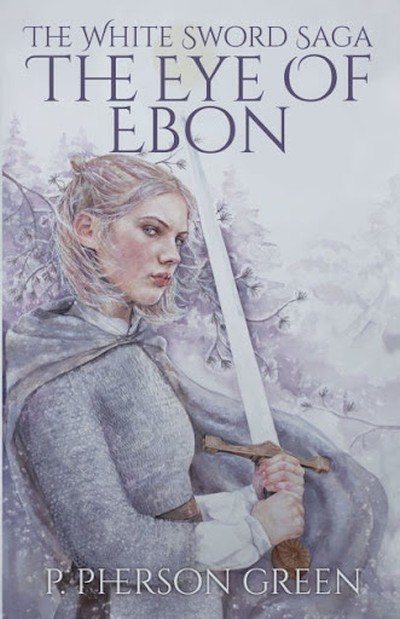 For all that, Green is his own person with his own literary vision and style; The Eye of Ebon is not a direct LOTR knock-off, in the way that Terry Brooks’ The Sword of Shanarra is. A major difference, of course, is the distaff perspective. While Tolkien’s Eowyn is an action-capable female, she’s not the heroine of the saga; his major characters, and most of the characters who display any real agency, or play a direct role in defeating evil, are male. Here, the two viewpoint characters, protagonist Samiare (whom you see depicted on the book’s cover) and essentially co-protagonist Rugette are both female, and formidable fighting females who carry the brunt of the book’s down-and-dirty struggle against evil, and who make the key, crucial gut wrenching and difficult moral decisions at the climactic points. (I was already inclined to rate the book at five stars, but those were the moments that clinched it, and for me moved this tale into the ranks of great, rather than merely good, literature!)
For all that, Green is his own person with his own literary vision and style; The Eye of Ebon is not a direct LOTR knock-off, in the way that Terry Brooks’ The Sword of Shanarra is. A major difference, of course, is the distaff perspective. While Tolkien’s Eowyn is an action-capable female, she’s not the heroine of the saga; his major characters, and most of the characters who display any real agency, or play a direct role in defeating evil, are male. Here, the two viewpoint characters, protagonist Samiare (whom you see depicted on the book’s cover) and essentially co-protagonist Rugette are both female, and formidable fighting females who carry the brunt of the book’s down-and-dirty struggle against evil, and who make the key, crucial gut wrenching and difficult moral decisions at the climactic points. (I was already inclined to rate the book at five stars, but those were the moments that clinched it, and for me moved this tale into the ranks of great, rather than merely good, literature!)
To be sure, unlike Rugette, whose combat skills, especially archery, result from rigorous training since she was in her early teens (I’d guess her to be about 30 here) and have been honed in years spent as a high-ranking warrior and scout fighting the Groll, Samiare, an untrained girl of 15, owes her prowess to a mysterious sword. At the very beginning of the main narrative, she lies dying in the snows of her homeland from cold and blood loss after being gang-raped by a band of Groll and renegade humans, who carved an obscenity on her belly, beat her and tortured her with branding irons, after killing her father and making off with her sister. When she cried out for deliverance “to the one god she knew –the one who watched over,” that sword was gifted to her by a glowing man-like being; and it proves to be no ordinary sword. But she still has to hold it and wield it –and make decisions about how she uses it.
The above paragraph suggests another difference from the Tolkien corpus; this narrative is much grittier, and gorier. While the gang-rape itself isn’t really directly described, we can tell it occurred; and while Green doesn’t make the brutalizing and torture here any more drawn-out than it has to be to make us feel it, he does make us do that. This sets a tone for a very violent book; there’s a lot of mortal combat action with edged weapons, and the Groll are an extremely sadistic and treacherous bunch, even to each other. (Tolkien, in a letter, once characterized the orcs as “almost irremediable,” but allowed that no being created by God is wholly irremediable. We get the impression here that the Groll may be; but even here, Green depicts them as having a claim to merciful treatment when they’re disabled in combat, which I regard as a plus.) So there’s a high body count, with quite a lot of humans and humanoids dying, often in nastily unpleasant ways. There’s no “pornography of violence,” but we do see the spilled entrails, severed limbs, split skulls, etc. However, there’s no quoted bad language, and no explicit sexual content. (In fact, the only reference to sex at all, besides the implied rape above, occupies a tastefully phrased single part of one sentence, in 230 pages of text proper. This would definitely not be characterized as a “romantasy.”)
Green has a serviceable, dignified and assured, naturally flowing prose style that holds interest well. Settings, scenes and people are described vividly enough to be pictured in the reader’s mind (and some of the scenes conjured rival those depicted by Robert E. Howard or A. Merritt for atmosphere and spectacle!), but not over-described. World-building is delivered along the way of the storyline, without info-dumps (there are a couple of roughly page-long appendices, “About the Silver World” and “The Four Lands,” which should be read). There aren’t many serious typos, the worst one being that “reigns” tends to be substituted when “reins” is meant (but that’s a quibble). We come to realize before long that the Prologue describes events taking place millennia before the main story, and occasional interspersed flashbacks set in the same time-frame aren’t distinguished by typeface or a heading; but the reader quickly comes to identify and understand these, and they do convey important information.
There’s no cliff-hanger here; the challenge of the main plot is brought to its conclusion. But it’s clear that the overall epochal struggle of the Four Lands is only beginning, and I’m invested in continuing the series!
Author: P. Pherson Green.
Publisher: Gold Dragon Publishing, available through Amazon, both for Kindle and as a printed book.
A version of this review previously appeared on Goodreads.
 The first volume is free on Amazon at time of writing, but all four are available for 99 cents, so you certainly can’t complain about value. It’s an interesting concept, too. Axira is a “spacer”, a member of an alien race feared to such an extent that they are almost legends. For centuries, she has been mentally chained up by a member of the Kore sects known only as “Master”, and compelled to do his bidding. Which usually involves copious amounts of violence, directed toward his enemies. Finally, Axira is able to break free and regain her independence, and vows to take revenge on Master.
The first volume is free on Amazon at time of writing, but all four are available for 99 cents, so you certainly can’t complain about value. It’s an interesting concept, too. Axira is a “spacer”, a member of an alien race feared to such an extent that they are almost legends. For centuries, she has been mentally chained up by a member of the Kore sects known only as “Master”, and compelled to do his bidding. Which usually involves copious amounts of violence, directed toward his enemies. Finally, Axira is able to break free and regain her independence, and vows to take revenge on Master.




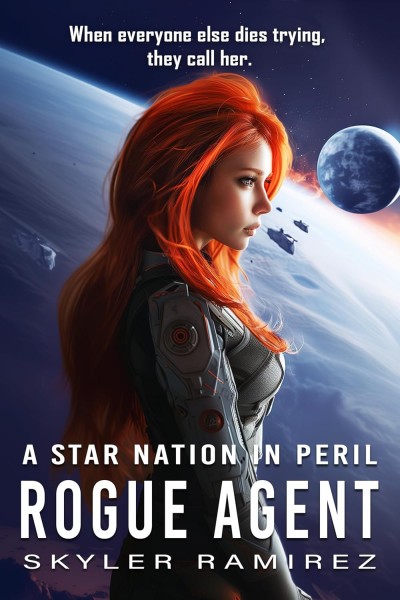 This is a solid, no-nonsense combination of spy and science-fiction. Though, to be honest, it is skewed towards the former genre, with the latter mostly window-dressing. It wouldn’t take much to change the setting from a solar system whose ownership is disputed by a couple of galactic empires, to a city whose ownership is disputed by a couple of countries. The planet is Hudson, claimed both by the Star Kingdom of Prometheus and the Koratan Confederacy. Heather Kilgore is among the best agents of the Promethean King’s Order, and is dispatched to Hudson after the suspicious death of a man who had betrayed the Kingdom, former commander Connor Monroe
This is a solid, no-nonsense combination of spy and science-fiction. Though, to be honest, it is skewed towards the former genre, with the latter mostly window-dressing. It wouldn’t take much to change the setting from a solar system whose ownership is disputed by a couple of galactic empires, to a city whose ownership is disputed by a couple of countries. The planet is Hudson, claimed both by the Star Kingdom of Prometheus and the Koratan Confederacy. Heather Kilgore is among the best agents of the Promethean King’s Order, and is dispatched to Hudson after the suspicious death of a man who had betrayed the Kingdom, former commander Connor Monroe I don’t subscribe to the belief that authors need to be the same sex, race, religion or whatever as their characters. A good author can put you inside the head of their heroine, even if they’re a different species, an extra-terrestrial, or whatever. But there needs to be an authenticity of voice for it to work. This is where, for example, Quentin Tarantino fails for me: his characters almost always end up sounding like Quentin Tarantino. And I wrote that before noticing the blurb on Amazon actually says, “Jerry Furnell exudes a Quentin Tarantino vibe in his narrative.” That’s meant as an incentive; I’d have taken it as a warning.
I don’t subscribe to the belief that authors need to be the same sex, race, religion or whatever as their characters. A good author can put you inside the head of their heroine, even if they’re a different species, an extra-terrestrial, or whatever. But there needs to be an authenticity of voice for it to work. This is where, for example, Quentin Tarantino fails for me: his characters almost always end up sounding like Quentin Tarantino. And I wrote that before noticing the blurb on Amazon actually says, “Jerry Furnell exudes a Quentin Tarantino vibe in his narrative.” That’s meant as an incentive; I’d have taken it as a warning.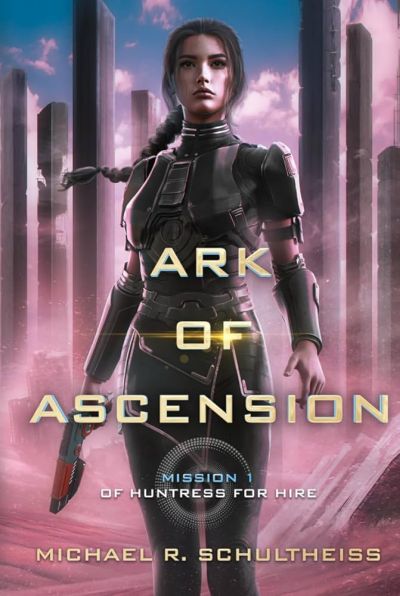 I don’t necessarily expect to understand a literary universe from the first page. These things take time: I get that. But I do expect that, as I go through the chapters, things will become clear. If I reach the end, and am still vague on a number of significant plot points, then something has gone wrong. Sadly, it’s the case here, and that largely hampered the effectiveness of the narrative. In this case, it had a cascading effect. Because I didn’t understand one situation, that rendered a character’s purpose uncertain, and this then meant the heroine’s motivation wasn’t clear.
I don’t necessarily expect to understand a literary universe from the first page. These things take time: I get that. But I do expect that, as I go through the chapters, things will become clear. If I reach the end, and am still vague on a number of significant plot points, then something has gone wrong. Sadly, it’s the case here, and that largely hampered the effectiveness of the narrative. In this case, it had a cascading effect. Because I didn’t understand one situation, that rendered a character’s purpose uncertain, and this then meant the heroine’s motivation wasn’t clear.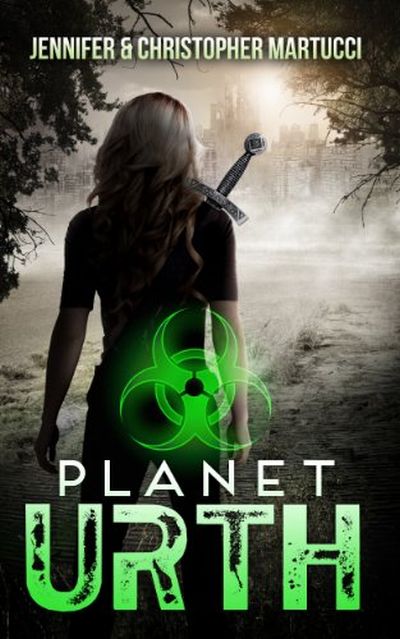 This is written by a husband and wife duo, which is a nice idea. I wonder how Chris would react if I suggested writing a novel to her? Unfortunately, the results are a little disappointing. It feels like the execution is better than the idea – usually it’s the other way around. For example, this is a post-apocalyptic scenario, except the book never details in more than the vaguest terms, what happened. It’s disposed of in about one page: a war, involving both bio- and nuclear weapons. Some humans went underground; those who didn’t, became “grotesquely distorted” mutants and calling themselves Urthmen. We’re now 200 years later, and they are still seeking to wipe out the dwindling number of “real” humans who abandoned their bunkers for some reasons. Those include Avery, in her late teens, and her sister, eight-year-old June, orphaned by the death of both parents: Mom killed by Urthmen, Dad… just kinda died, I guess.
This is written by a husband and wife duo, which is a nice idea. I wonder how Chris would react if I suggested writing a novel to her? Unfortunately, the results are a little disappointing. It feels like the execution is better than the idea – usually it’s the other way around. For example, this is a post-apocalyptic scenario, except the book never details in more than the vaguest terms, what happened. It’s disposed of in about one page: a war, involving both bio- and nuclear weapons. Some humans went underground; those who didn’t, became “grotesquely distorted” mutants and calling themselves Urthmen. We’re now 200 years later, and they are still seeking to wipe out the dwindling number of “real” humans who abandoned their bunkers for some reasons. Those include Avery, in her late teens, and her sister, eight-year-old June, orphaned by the death of both parents: Mom killed by Urthmen, Dad… just kinda died, I guess. Independent Goodreads author (and one of my Goodreads friends) P. Pherson Green has been writing since the late 90s, and has previously had short stories published in various venues. However, this novel, the opener for his projected White Sword Saga series, is his long-fiction debut. He graciously gifted me with a hardcover review copy; no guarantee of a favorable review was requested, or given. My wife and I read the book together, during the intermittent and usually short times we were both traveling together in the car; so the nearly two months it took to read is misleading. It would have been a much quicker read if I’d read it by myself, devoting all of my individual reading time to it.
Independent Goodreads author (and one of my Goodreads friends) P. Pherson Green has been writing since the late 90s, and has previously had short stories published in various venues. However, this novel, the opener for his projected White Sword Saga series, is his long-fiction debut. He graciously gifted me with a hardcover review copy; no guarantee of a favorable review was requested, or given. My wife and I read the book together, during the intermittent and usually short times we were both traveling together in the car; so the nearly two months it took to read is misleading. It would have been a much quicker read if I’d read it by myself, devoting all of my individual reading time to it. For all that, Green is his own person with his own literary vision and style; The Eye of Ebon is not a direct LOTR knock-off, in the way that Terry Brooks’ The Sword of Shanarra is. A major difference, of course, is the distaff perspective. While Tolkien’s Eowyn is an action-capable female, she’s not the heroine of the saga; his major characters, and most of the characters who display any real agency, or play a direct role in defeating evil, are male. Here, the two viewpoint characters, protagonist Samiare (whom you see depicted on the book’s cover) and essentially co-protagonist Rugette are both female, and formidable fighting females who carry the brunt of the book’s down-and-dirty struggle against evil, and who make the key, crucial gut wrenching and difficult moral decisions at the climactic points. (I was already inclined to rate the book at five stars, but those were the moments that clinched it, and for me moved this tale into the ranks of great, rather than merely good, literature!)
For all that, Green is his own person with his own literary vision and style; The Eye of Ebon is not a direct LOTR knock-off, in the way that Terry Brooks’ The Sword of Shanarra is. A major difference, of course, is the distaff perspective. While Tolkien’s Eowyn is an action-capable female, she’s not the heroine of the saga; his major characters, and most of the characters who display any real agency, or play a direct role in defeating evil, are male. Here, the two viewpoint characters, protagonist Samiare (whom you see depicted on the book’s cover) and essentially co-protagonist Rugette are both female, and formidable fighting females who carry the brunt of the book’s down-and-dirty struggle against evil, and who make the key, crucial gut wrenching and difficult moral decisions at the climactic points. (I was already inclined to rate the book at five stars, but those were the moments that clinched it, and for me moved this tale into the ranks of great, rather than merely good, literature!)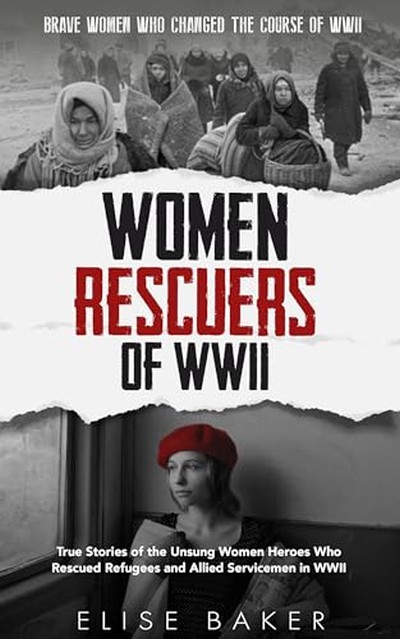 With the somewhat accurate and rather clunky sub-title of “True stories of the unsung women heroes who rescued refugees and Allied servicemen in WWII”, this is a book whose idea I liked rather more than the execution. The core is six chapters, each devoted to a woman or pair of women, who operated before and around World War II, mostly helping refugees to escape the Nazi regime as it swept across Europe. Every chapter has the same structure. Each begins with ‘The Threshold’, describing how they came to take on that role; then ‘The Move’, covering their heroic activities; and finally, ‘The Close’, detailing what happened to them afterward.
With the somewhat accurate and rather clunky sub-title of “True stories of the unsung women heroes who rescued refugees and Allied servicemen in WWII”, this is a book whose idea I liked rather more than the execution. The core is six chapters, each devoted to a woman or pair of women, who operated before and around World War II, mostly helping refugees to escape the Nazi regime as it swept across Europe. Every chapter has the same structure. Each begins with ‘The Threshold’, describing how they came to take on that role; then ‘The Move’, covering their heroic activities; and finally, ‘The Close’, detailing what happened to them afterward.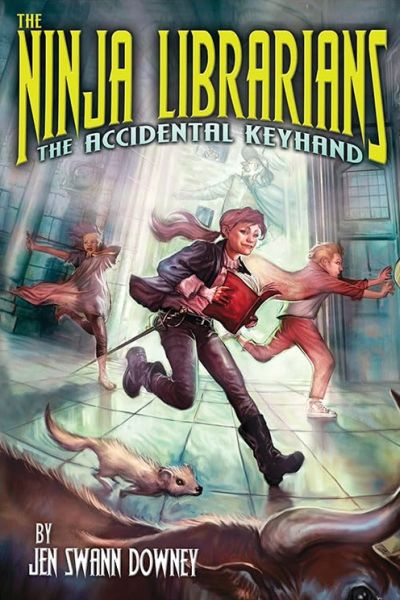 (That quote also answers the question of whether this is fantasy or science fiction; that would depend on whether the author intended us to view the speculative elements as enabled by magic –which, as noted above, she did!– or by natural phenomena/technology unknown to present science.) 12-year-old protagonist Dorothea “Dorrie” Barnes is a library-loving kid growing up in Passaic, New Jersey (I suspect this might be Downey’s hometown, but can’t confirm that), in a chaotic household with her inventor father, college instructor mom, 14-year-old brother Marcus, and three-year-old sister Miranda. (The family shares the house with her great-aunt Alice, who’s an anthropologist.) Dorrie’s a pretty ordinary tween, albeit one with a sense of justice and a liking for the idea of sword-fighting against villains; she’s got a blunt practice sword and takes a library-sponsored fencing and stage combat class. But when the book opens on the day of the library’s annual Pen and Sword Festival (a sort of low-budget Renaissance Faire), a succession of freak events will very soon suck Dorrie and Marcus into a most un-ordinary experience….
(That quote also answers the question of whether this is fantasy or science fiction; that would depend on whether the author intended us to view the speculative elements as enabled by magic –which, as noted above, she did!– or by natural phenomena/technology unknown to present science.) 12-year-old protagonist Dorothea “Dorrie” Barnes is a library-loving kid growing up in Passaic, New Jersey (I suspect this might be Downey’s hometown, but can’t confirm that), in a chaotic household with her inventor father, college instructor mom, 14-year-old brother Marcus, and three-year-old sister Miranda. (The family shares the house with her great-aunt Alice, who’s an anthropologist.) Dorrie’s a pretty ordinary tween, albeit one with a sense of justice and a liking for the idea of sword-fighting against villains; she’s got a blunt practice sword and takes a library-sponsored fencing and stage combat class. But when the book opens on the day of the library’s annual Pen and Sword Festival (a sort of low-budget Renaissance Faire), a succession of freak events will very soon suck Dorrie and Marcus into a most un-ordinary experience….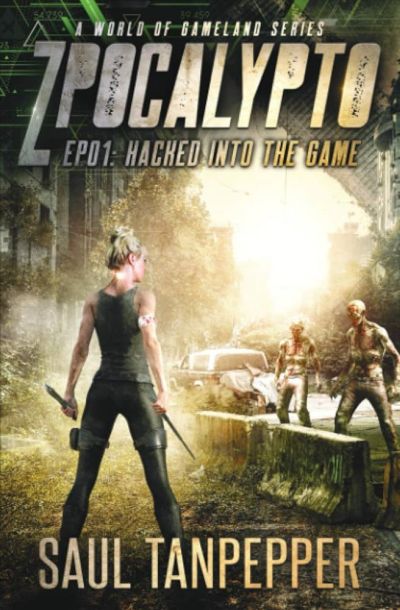 The literary rating is mostly down to the sluggish way in which this gets going. Though having subsequently discovered this is the first in a
The literary rating is mostly down to the sluggish way in which this gets going. Though having subsequently discovered this is the first in a 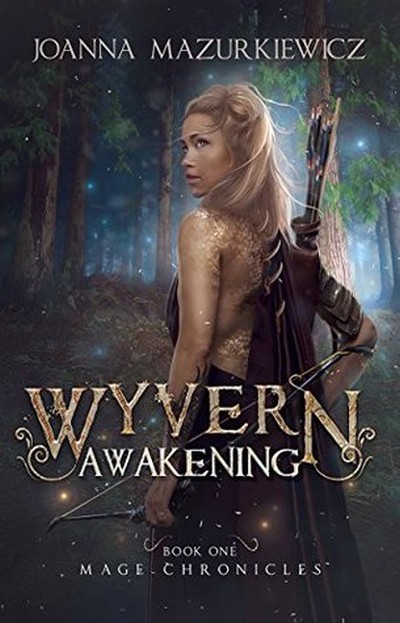 There are reviews which are easy to write, because – good or bad – the subject generates a lot to talk about. This is not one of those. It’s a bland slice of semi-urban fantasy, which just… sits there, the literary equivalent of a bowl of vanilla pudding. It’s not good, nor is it bad enough to be memorable. It merely exists, remarkable mostly in how unremarkable it is. Put it this way, I finished it less than 24 hours ago, and I can’t even remember the heroine’s name, so little impression was made. Instead of writing, I find myself almost preferring the Star Trek musical episode Chris is watching next to me. And I don’t really like Star Trek. Or musical episodes.
There are reviews which are easy to write, because – good or bad – the subject generates a lot to talk about. This is not one of those. It’s a bland slice of semi-urban fantasy, which just… sits there, the literary equivalent of a bowl of vanilla pudding. It’s not good, nor is it bad enough to be memorable. It merely exists, remarkable mostly in how unremarkable it is. Put it this way, I finished it less than 24 hours ago, and I can’t even remember the heroine’s name, so little impression was made. Instead of writing, I find myself almost preferring the Star Trek musical episode Chris is watching next to me. And I don’t really like Star Trek. Or musical episodes.